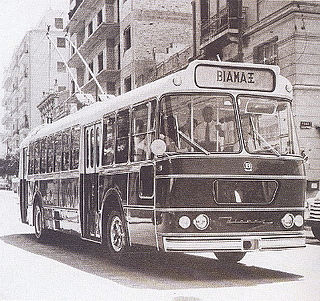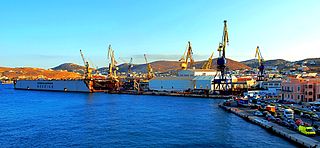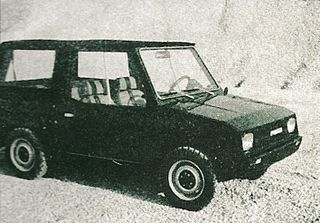The Volvo Group is a Swedish multinational manufacturing corporation headquartered in Gothenburg. While its core activity is the production, distribution and sale of trucks, buses and construction equipment, Volvo also supplies marine and industrial drive systems and financial services. In 2016, it was the world's second-largest manufacturer of heavy-duty trucks.

Leyland Motors Limited was a British vehicle manufacturer of lorries, buses and trolleybuses. The company diversified into car manufacturing with its acquisitions of Triumph and Rover in 1960 and 1967, respectively. It gave its name to the British Leyland Motor Corporation, formed when it merged with British Motor Holdings in 1968, to become British Leyland after being nationalised. British Leyland later changed its name to simply BL, then in 1986 to Rover Group.

Eicher Motors Limited is an Indian multinational automotive company that manufactures motorcycles and commercial vehicles, headquartered in New Delhi. Eicher is the parent company of Royal Enfield, a manufacturer of middleweight motorcycles.

Theologou was one of the first vehicle manufacturers in Greece. It was created by Nikos Theologos, a Greek mechanic who had lived and worked for a few years in the US, and founded this company after he returned to Athens, Greece in 1906. Around 1916 he designed and constructed a light passenger car with a motorcycle engine; according to his descendants, the efforts had started in 1908, and since 1916 a small number were built. His company, nonetheless, produced a variety of bus and truck bodies, mostly on Ford chassis in the 1920s. By the late 1920s it was facing strong competition by larger companies like Tournikiotis and Athena in Athens, Bouhagier in Patras and others, which also produced vehicles on imported chassis, and was soon eclipsed by them.

BIAMAX(Proper Greek pronunciation Viamax) was a Greek vehicle manufacturer. In the late 70's it was one of the biggest Greek companies, operating three factories and several other auxiliary facilities throughout the country. In addition, BIAMAX became a leading industry in Greece, in areas including Quality Assurance, technical training, process documentation and Research & Development. Although its main activity was vehicle manufacture, some of its subsidiaries were also involved in areas like tourist services, exports of farm products and shipping.

Petropoulos is today a major importer and distributor of vehicles and heavy machinery, having been, at the same time, one of the historic Greek tractor, vehicle and engine manufacturers.

The Sfakianakis group of companies is a Greek conglomerate with a wide range of activities, employing over 2800 in 6 countries in 2014.

Neorion is one of the oldest Greek heavy industries, located in Ermoupolis, on the Greek island of Syros. Today, it is one of the few remaining major industrial corporations in what used to be the industrial and commercial center of Greece, before being eclipsed by Piraeus in the late 19th century.

Hellenic Vehicle Industry is a Greek vehicle manufacturer based in Thessaloniki.

MAVA Company was the Greek importer of Renault automobiles. In 1979, it decided to enter the car-production business introducing a passenger-utility car, a type then very popular in Greece for tax cetagorization reasons. MAVA assigned the creation of the car to Georgios Michael, a Greek designer credited with the design of Neorion Chicago, as well as that of several other Greek vehicles. Michael and his team completed the development and prototype construction in record-time and the car, named Farma, was introduced the same year. MAVA had insisted that the car should be presented as a "Renault model" and thus the prototype was tested and approved by the French company.
Intracom Holdings is the main shareholder of a group of multinational companies specialized in IT services, construction projects and defense electronics systems.

The automotive industry in China has been the largest in the world measured by automobile unit production since 2008. Since 2009, annual production of automobiles in China accounted for more than 32% of worldwide vehicle production, exceeding both that of the European Union and that of the United States and Japan combined.
TEMAX is a specialised manufacturer of fire and rescue vehicles, trailers and equipment based in Athens, Greece. The company also manufactures snow-clearing equipment.

Tropical is a Greek manufacturer involved in machinery and vehicle development and production. Its history is characteristic of a company which has made significant efforts to evolve in a country that effectively forbids production of locally developed passenger cars.
Triangle Group is a Chinese tire company that manufactures a range of tires for vehicles from passenger cars to construction equipment and tires fit for special purposes under the Triangle and DIAMONDBACK brands. As of 2015 it is the 14th largest tire maker in the world according to Tyres & Accessories.

The automotive industry in Pakistan is one of the fastest-growing industries in the country, growing by 171% between just 2014 and 2018. It accounts for 4% of Pakistan's GDP and employs a workforce of over 3.5 million people as of 2018. Pakistan is the 35th largest producer of automotives. Its contribution to the national exchequer is nearly Rs. 50 billion (US$220 million). Pakistan's auto market is among the smallest, but fastest-growing in Asia. 269,792 cars were sold in the year 2018, but declined to 186,716 in 2019 as a result of austerity measures. Pakistan used to have a lot of Japanese cars in the 1990s and early 2000s. With the launch of the first Auto Policy in 2005, Pakistan launched its very first indigenous car Adam Revo but after the 2008 elections the dollar started depreciating and due to bad governance a lot of auto makers started to halt production and some even exited Pakistan. At present, the auto market is dominated by Honda, Toyota and Suzuki. However, on 19 March 2016, Pakistan passed a second "Auto Policy 2016-21", which offers tax incentives to new automakers to establish manufacturing plants in the country. In response, Renault, Nissan, Proton Holdings, Kia, SsangYong, Volkswagen, FAW and Hyundai have expressed interest in entering the Pakistani market. MG JW Automobile Pakistan has signed memorandum of understanding (MoU) with Morris Garages (MG) Motor UK Limited, owned by SAIC Motor to bring electric vehicles in Pakistan. NLC signed an agreement with Mercedes Benz for the manufacturing of Mercedes Actros trucks in Pakistan. Pakistan has not enforced any automotive safety standards or model upgrade policies. A few old models of vehicles including the Bolan and Ravi continue to be sold by Suzuki. On 8 July 2021, Jolta Electric launched production of electric motorcycles.

Bouhagier Patras or Buhayer Patras was considered to be the longest-lived vehicle body manufacturer in Greece. It was founded in 1890 and dissolved in 2004.
This article provides an overview of the automotive industry in countries around the world.

Autokinitoviomihania Ellados was founded in Athens in 1975 by a group of Greek businessmen, including the owners of the company importing Fiat in Greece.

Biomot was a small manufacturer of three-wheeled trucks and other metal products, based in Patras, Greece. Its trucks, produced since 1967, originally used rear-mounted VW air-cooled engines, as well as other VW parts. By 1975 the market for these vehicles had shrunk in Greece, being replaced by four-wheeled imported types. A new “modernized” front-engined model introduced by Biomot failed to save the company.

















